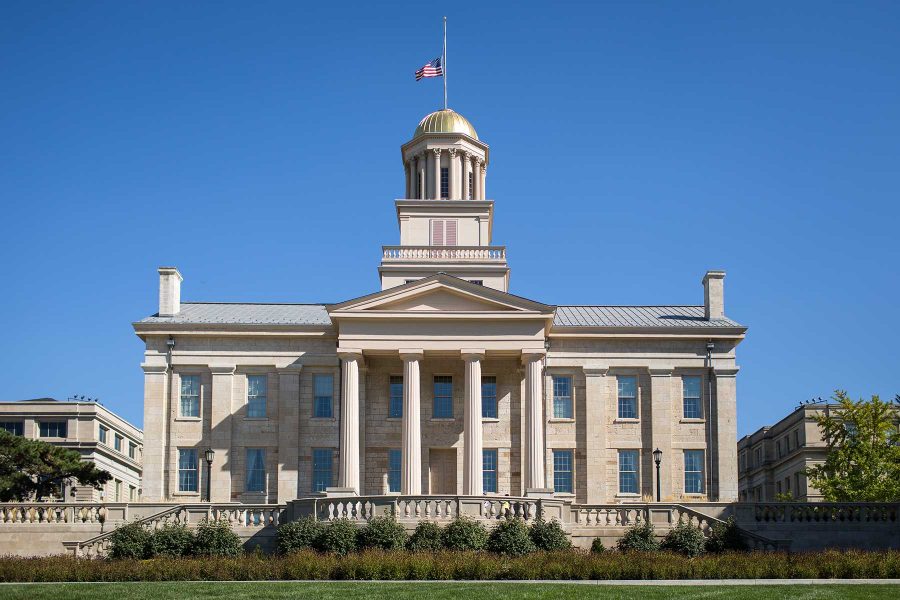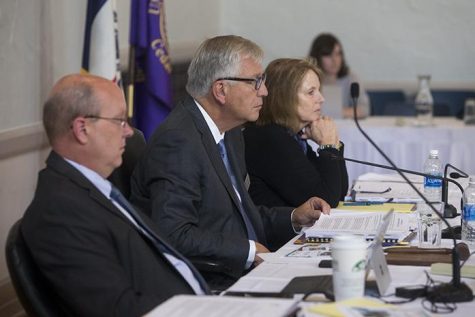Kumar: Budget cuts and broke college students
Across the nation, tuition prices are rising and education budgets are being slashed. The 2018 midterm elections can change that if students vote.
September 9, 2018
Life has basically been planned out for us since birth: You try hard in school, graduate, get into college, and then get a good job. Unfortunately, things aren’t that straightforward nowadays because of the ever-increasing tuition.
College isn’t a feasible option anymore but continues to be sold as the only option. Tuition is so high in this country that the value of an education is being questioned because it can no longer be justified as a return on investment when you’re thousands of dollars in debt.
Here in Iowa, rising tuition and an always-shrinking education budget is nothing new, and the story is similar across the country. In the last two budget years alone, the state has taken back about $35 million in support for the universities governed by the state Board of Regents. The student vote can change all that in the upcoming midterm elections if we vote for candidates with solutions to the problem.
We all know that about 30 years ago, you could work while attending classes to pay for them. The reality today is a far cry from that, and working the maximum allowed 20 hours a week at the UI barely covers rent. We haven’t seen a big surge in tuition costs since the recession; instead, we’ve seen small increase over the years.
Inside Higher Ed reports, “Seemingly small annual increases can add up over decades. The published tuition and fee price in the public four-year sector was 3.13 times higher in 2017-18 than it was in 1987-88. The tuition and fee price in the private, nonprofit four-year sector was 2.29 times higher in 2017-18 than it was 30 years earlier. The price in the public two-year sector was 2.25 times higher.”
A lot of the blame for these tuition increases can be placed on the lack of state funding (for public schools). Enrollment is up compared to enrollment from decades ago, but if states don’t increase funding or just cut the budget (such as Iowa), students will receive less support and be forced to cough up more out-of-pocket. An annual College Board report on trends in college pricing shows that from 2005-06 to 2010-11, total funding from appropriations rose by 2 percent. Meanwhile, enrollment spiked by 19 percent, and as a result, per-student funding fell by 14 percent.
Federal Reserve data show that student-loan debt is up to $1.53 trillion in the second quarter of 2018. In the last five years alone, that number has increased from $1.15 trillion in 2013.
That much debt is not a sustainable option. Students shouldn’t be punished for a system the government refuses to fix. Education should be an option for all, especially when so many jobs rely on having some sort of degree, whether it’s a two-year, or four-year, or postgraduate program.
Economically speaking, if so many people carry so much debt when they enter the workforce, that’s less money they will spend on goods and services. Instead of an investment in our country and strong economy, the government has let education become a business.
The state of Iowa has imposed midyear budget cuts to our state universities. This meant the UI had to stop renovating buildings that needed it, stop offering certain scholarships, and raise tuition. Education funding is not a priority for Gov. Kim Reynolds (R) and a lot of other candidates. Reps. Steve King and David Young, R-Iowa, don’t even have education listed as an issue on their website.
U.S. News ranks Iowa as eighth in the nation for higher education and pre-K-12. To keep our ranking, students need candidates who will put policies in place to decrease student debt and make tuition affordable. It’s vital that we as students vote for candidates who will do something about tuition hikes and student debt, even if it means forcing an answer.


















